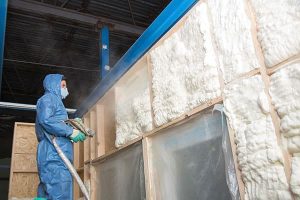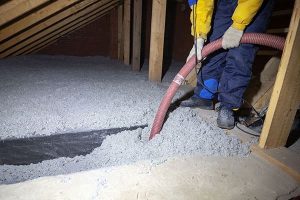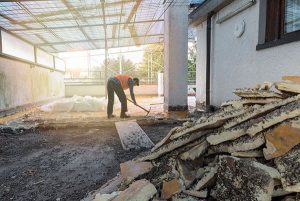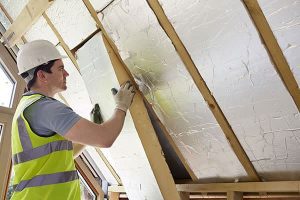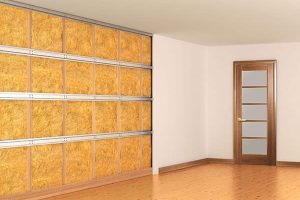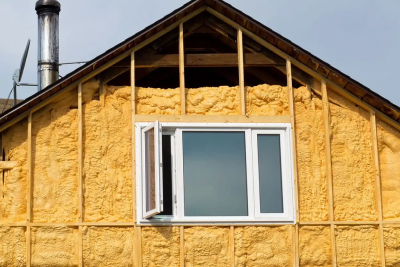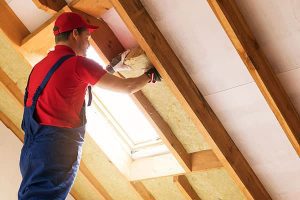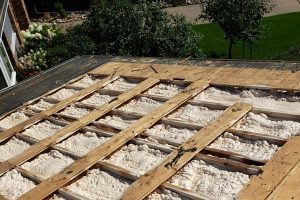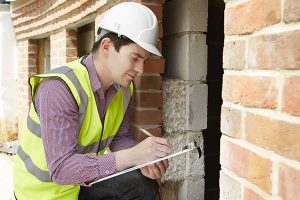Efficient and durable, spray foam is a modern insulation material great for both residential and commercial applications. Spray foam can form a water-resistant and airtight seal in ceilings, walls, and basements. Alberta winters can be harsh, and spray foam can improve your home or business with energy-efficient and draft-free protection.
Spray foam’s versatility goes beyond residential and commercial insulation installs: this is an excellent material to insulate trailers and containers. Storage containers have to deal with extreme temperatures and exposure to the elements. Spray foam can form a water-resistant seal that protects from heat, cold, rain, and snow.
Installing spray foam insulation requires training and experience. At Proinsulate we have years of experience in the Edmonton and Sherwood Park areas. Our technicians are expertly trained and have years of experience from thousands of successful projects. Residential or commercial, we can help you meet insulation regulations and bylaws. Correctly insulated buildings are quieter and more energy efficient. Our spray foam insulation services can also help you protect trailers, containers, and their contents. Contact us for a professional assessment and we’ll walk you through your choices, and help you make the best decision for your project.
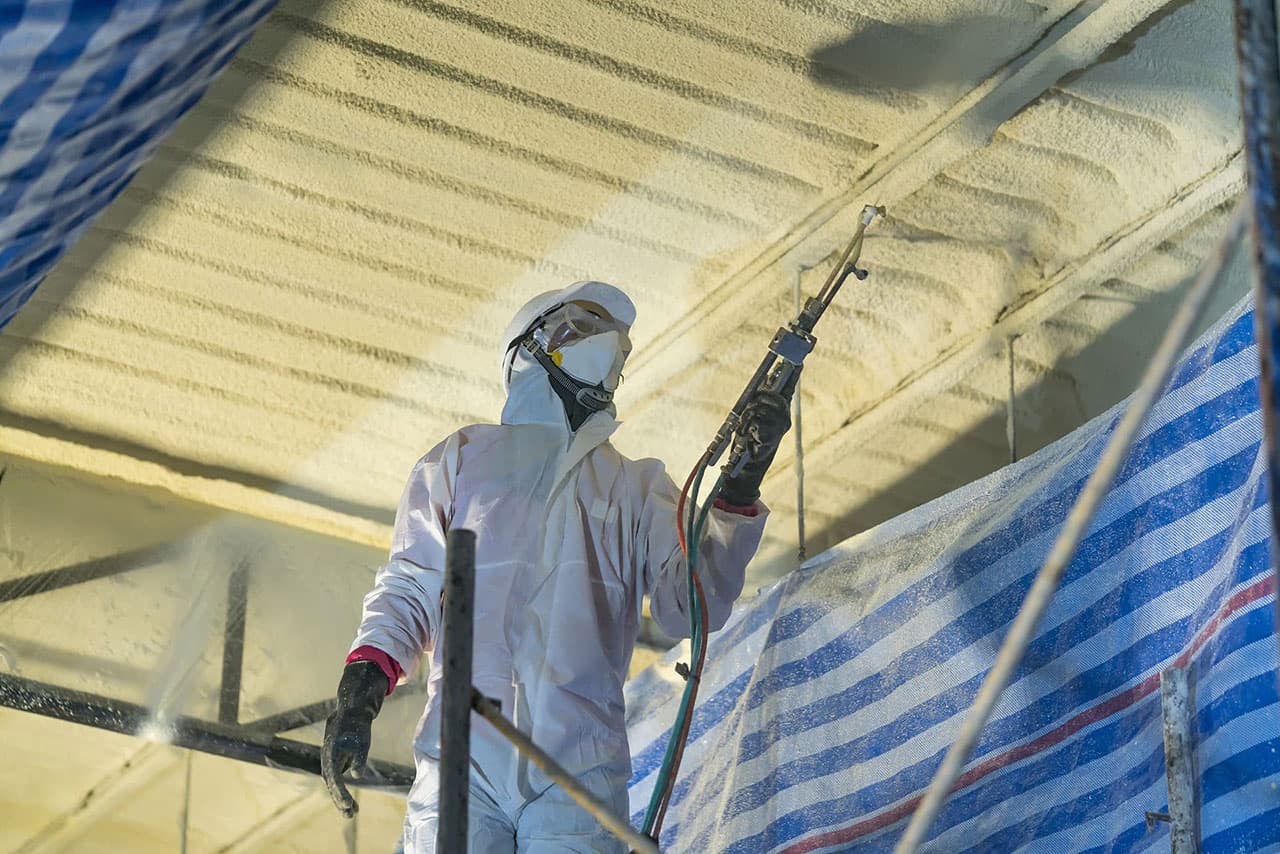
Home and Residential Spray Foam Installation
Residential buildings can benefit from spray foam’s excellent insulation rating and ability to form airtight seals. Common residential insulation materials include fiberglass batting, blown-in cellulose, and Rockwool. Some of these offer good insulation protection while others are cheaper and easier for home builders to install during construction. Unfortunately, other insulation materials don’t offer airtight seals or complete vapor protection on their own. Spray foam can provide an airtight seal in attics, basements, and walls. This gives your home greater energy efficiency and can reduce drafts. Spray foam is also water resistant, and a great solution for cold, moist basements.
Ceiling insulation is the most important part of your home’s thermal protection. Spray foam can be applied between ceiling joists and irregular corners which are difficult to protect with cut insulation sheets. Unlike fiberglass batting, spray foam forms an airtight and water-resistant seal which can reduce heat loss and stand up to minor roof leaks.
The right amount of spray foam between wall studs not only provides thermal insulation it can also give you a quieter home environment. Soundproofing is important in multi-tenant buildings, but can also be useful for homes near busy roads and intersections. While most people think of spray foam as a thermal insulator it can also lower sound transmission between rooms and from noisy outdoor areas.
If you’re dealing with drafty floors, an under-insulated basement may be to blame. Many basements in Alberta lack proper insulation. This can lead to drafty floors and water vapor condensation in basements. Spray foam can seal and insulate basement ceilings preventing cold, drafty floors upstairs. Properly insulated basement walls can help to prevent water condensation. Spray foam insulation forms an excellent vapor barrier and can withstand some moisture from outside soil when correctly applied.
Commercial Spray Foam
Spray foam insulation can help commercial builders and owners meet energy efficiency targets while providing long-lasting protection against pest infestations and water damage. Insulation in commercial environments can be challenging: fire-resistance and energy efficiency bylaws can give you compliance headaches. Commercial buildings have greater plumbing and electrical challenges for insulation installers. Spray foam can conform to irregular surfaces and tight spaces often found in commercial-use buildings, and the smooth surface it creates is a great foundation for further fire-resistance treatments which are often required by building regulations.
Commercial customers have a complex regulatory environment and additionally must contend with demanding tenants and clients. Professional spray foam installers understand commercial building bylaws in Alberta and the Edmonton/Sherwood Park area and can complete a spray foam insulation install that meets requirements and satisfies tenants while staying within budget.
Many commercial customers are tempted to use untrained maintenance personnel for spray foam insulation installs. This is often a mistake as correct spray foam installation involves more than just applying the product. There are many different spray foam materials and additives to choose from. Additionally, fire-resistant and fire-stopping coatings are often needed in commercial environments. These extra coatings may not be compatible with all spray foam insulation products. Trained and experienced professionals are needed to select the right mix of insulation and coating which achieves your project’s goals.
Firestopping and Spray Foam Insulation
Spray foam insulation in Alberta often needs to achieve compliance with fire-resistance bylaws. While spray foam isn’t fireproof on its own, it can be paired with a range of coatings that add different levels of fire protection. This is especially important when designing a fire-stopping installation with a mix of fire-resistant spray foam and additional fire-stopping materials.
Common fireproof coatings include DC315, Monokote® Z-3306, and Southwest Type 7TB. Deciding which is most appropriate for your commercial spray foam insulation installation is a task best left to professionals. Some coatings are appropriate for only specific types of spray foam insulation. More importantly, your commercial environment may include hazards that prohibit one or more types of coatings.
Every commercial environment is different. Some structures need high fire resistance ratings only, while some also must contend with water or corrosive chemicals. Picking the right spray foam insulation package can help you meet regulatory targets and provide years of maintenance-free service. Correctly fireproofed spray foam is an important foundation for a larger fire-stopping installation project.
Containers and Vehicles
Spray foam insulation can be an ideal solution for trailers and containers. Exposure to movement and the elements presents unique challenges for insulation. A container can be shipped across the country and sit outside storage for months. When converted into mobile offices, containers still have to handle punishing shipping while providing a comfortable environment for workers when placed on-site. Conventional insulation can shift and settle, but spray foam adheres to surfaces and keeps enough flexibility to cope with movement from shipping and daily use. In addition, spray foam creates a water-resistant seal which can help containers avoid leaks during heavy rains.
Beyond containers, spray foam insulation can add value to many types of vehicles and trailers. Spray foam’s water resistance and flexibility make it a great material for anything that spends time on the road. Thermal insulation is important, but spray foam is also excellent sound protection that can keep interiors quiet during travel. If you plan to remodel an RV or caravan, spray foam can keep your vehicle quiet on the road and when parked at your destination. The right spray foam insulation can reduce fuel consumption for heating and cooling which makes your vehicle more economical to use.
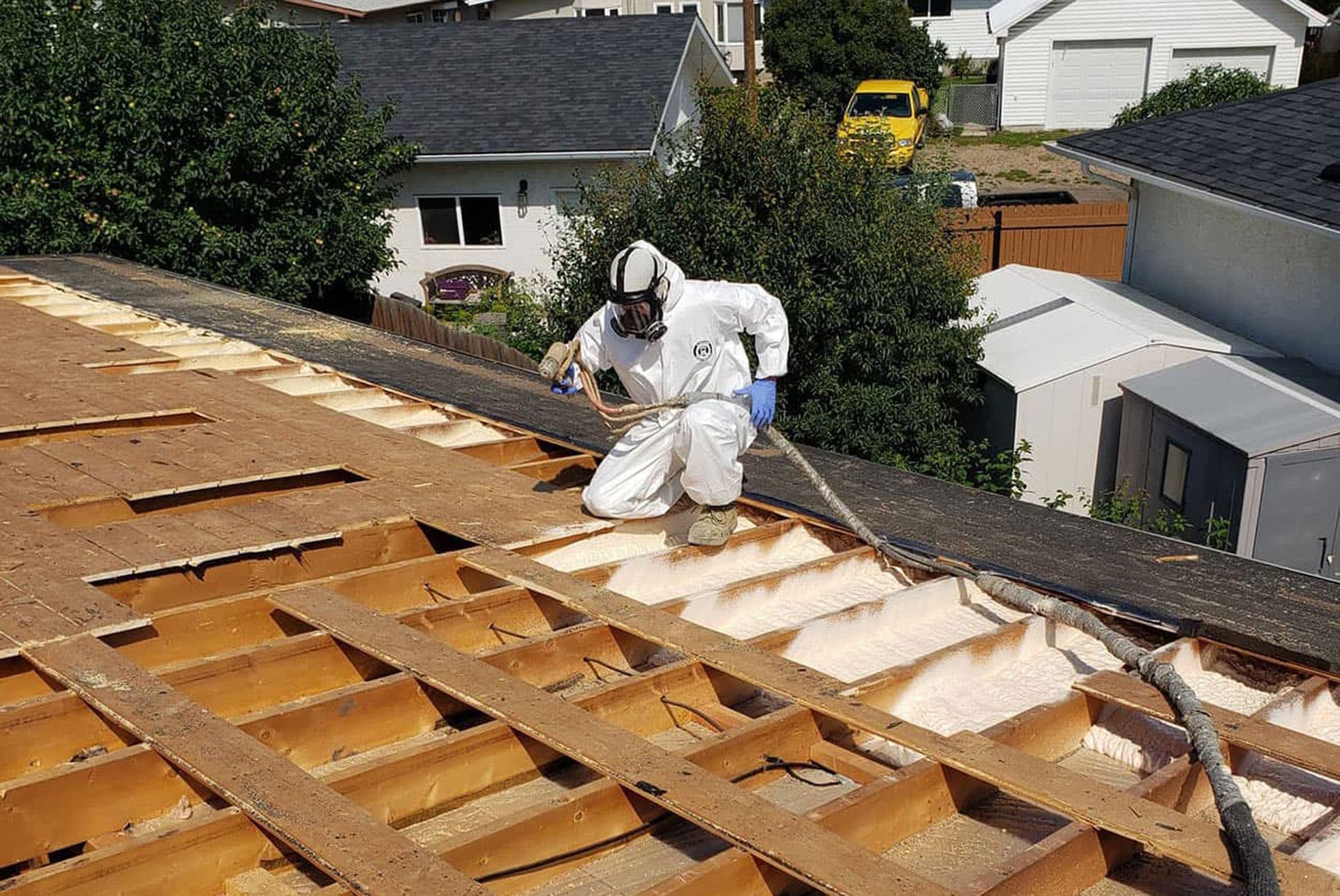
Why Professional Spray Foam Installation Is Important
Non-professional spray foam installs can be a bad idea for a few reasons. A DIY spray foam installation can suffer from problems related to safety, economy, and longevity. Professional installers know how to successfully apply spray foam in a variety of applications. It’s easy to use too much material which wastes money. Or use the wrong spray foam materials which can make your installation less safe. Finally, experienced installers know the right mix of materials and techniques to ensure years of maintenance-free service. Without extensive training and experience, it’s easy for DIY installers to make mistakes that reduce the life expectancy of their spray foam insulation. Spray foam is a durable material and can last decades when correctly installed.
Installing spray foam is a skill. Without experience, it’s possible to apply more material than necessary. Wasting spray foam can result in a higher final cost than hiring professionals to handle the installation. Spray foam expands after application, it’s easy to end up with too much which must be trimmed later in your project. Depending on the target surface, too much spray foam can result in warping, bending, or other damage to structural components or exterior surfaces.
When spray foam cures it generates heat. This can build up and cause damage if applied by non-professionals. This is particularly important when using spray foam insulation in vehicles and containers. Applying spray foam incorrectly to interior surfaces can easily cause enough heat to warp metal and damage exterior paint and finish. Professional spray foam installers understand how to manage the heat produced and can prevent damage to structures and surfaces.
Proinsulate is Local and Family Owned
Benefit from the expertise of local talented insulation installers who understand the Alberta climate. Proinsulate has the experience to provide sound recommendations based on your specific needs and provide top-quality insulation installations. Contact us today to get a quote on your spray foam insulation project and you can rest assured it will be taken care of efficiently and properly.
Frequently Asked Questions about Spray Foam Insulation
Proinsulate Service Areas
Our team works in Edmonton and surrounding areas including Stony Plain, Spruce Grove, St. Albert, Sherwood Park, Fort Saskatchewan, and Leduc. If you have any questions about an insulation project in your area, don’t hesitate to reach out to our team.
CITIES WE SERVE
COMMUNITIES WE SERVE
COMMUNITIES WE SERVE
COMMUNITIES WE SERVE
What our Clients Say
Similar Insulation Services
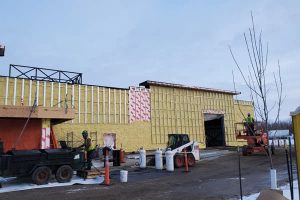

Commercial Insulation
Create a safe and effective working environment with better thermal and fireproof protections, effective moisture and vapour barriers and reduce unnecessary noise pollution









